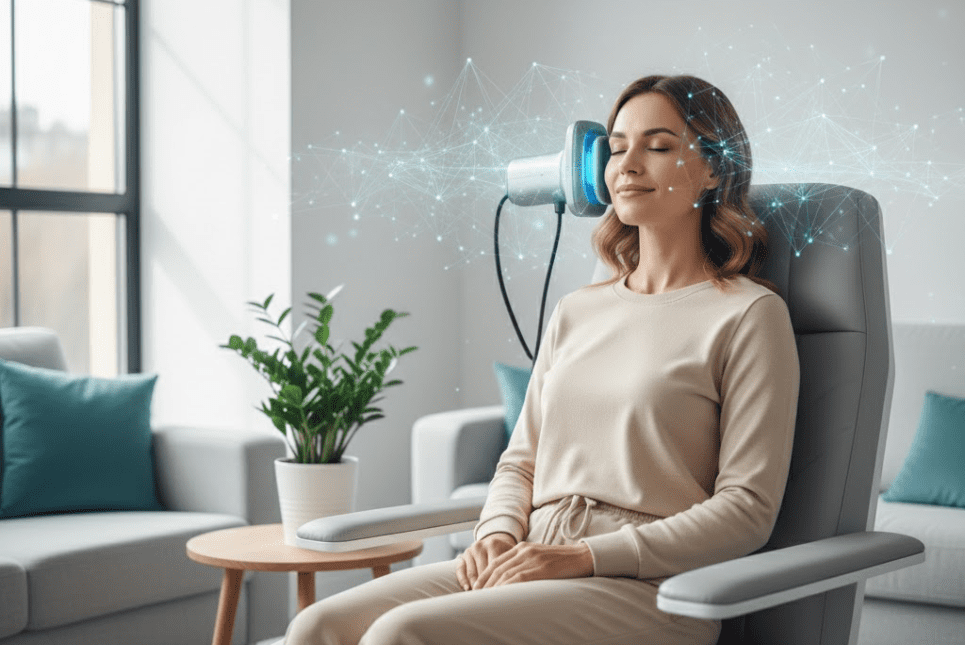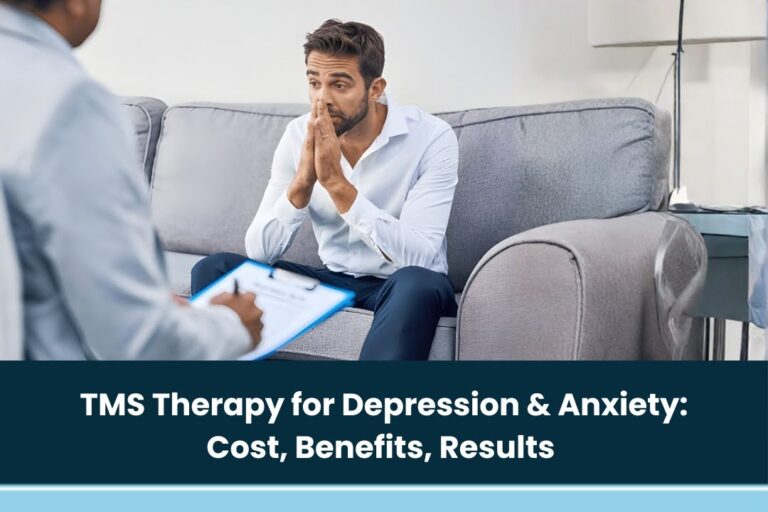
A holistic approach views depression and anxiety as more than chemical imbalances; they’re the result of multiple factors, including stress, hormones, diet, sleep, and unresolved emotions. Rather than masking symptoms, holistic care looks at why they exist in the first place. This may involve blending traditional therapies like TMS with mindfulness, nutrition counseling, and lifestyle changes that promote overall wellness.
Emotional, Physical, and Environmental Factors
Our emotions don’t exist in isolation; they’re influenced by our physical health and surroundings. For instance, chronic inflammation, hormonal shifts, and even poor gut health can affect neurotransmitter activity, the same brain chemicals responsible for mood. A holistic plan considers these layers to help restore harmony in the body and mind, creating sustainable results rather than temporary relief.
Evidence Supporting Holistic Anxiety and Depression Treatment
More research supports the value of combining traditional and alternative therapies. Studies show that patients who integrate TMS therapy with stress-reduction techniques, healthy nutrition, and counseling often experience improved long-term outcomes. By taking care of both the nervous system and the emotional self, individuals build resilience, the foundation for lasting mental wellness.
How TMS Therapy Enhances Neuroplasticity and Emotional Balance
Understanding TMS and Neuroplasticity
TMS works by delivering gentle magnetic pulses to targeted brain regions responsible for mood regulation. These pulses help stimulate neural activity and encourage neuroplasticity, the brain’s ability to rewire itself and form new, healthier connections. Over time, this process can lift symptoms of depression and anxiety by retraining the brain to respond differently to stress and emotion.
Strengthening Neural Pathways for Mood Regulation
Think of neuroplasticity as exercise for the brain. When certain neural pathways become underactive due to depression, TMS helps “wake them up,” promoting balanced communication between brain cells. As these pathways strengthen, emotional stability and mental clarity improve, helping patients regain control over their thoughts and reactions.
Outcomes of TMS Therapy on Emotional Health
Patients often describe feeling calmer, clearer, and more emotionally steady after a few weeks of TMS sessions. This isn’t just a placebo effect; it’s the result of measurable changes in brain function. Many individuals who struggled with chronic anxiety or depressive episodes report improved sleep, increased motivation, and a renewed sense of optimism.
Combining TMS with Other Therapeutic Modalities
The best results often come from integrating TMS with counseling, mindfulness, or physical wellness strategies. When therapy aligns with the brain’s enhanced neuroplasticity, emotional healing becomes more profound and enduring. This combination is at the heart of the holistic approach to depression treatment, healing through harmony between science and the self.
Integrating Mind and Body Is Key to Long-Term Mental Wellness
The connection between your mind and body is deeper than most people realize. Your thoughts affect your hormones, immune system, and even how your body handles inflammation. A tense mind creates a tense body, and vice versa. That’s why integrated mental health approaches like Holistic TMS Therapy aim to align both physical and emotional systems.

The Role of TMS in Resetting the Nervous System Naturally
When someone experiences chronic stress or trauma, their nervous system can become “stuck” in a fight-or-flight mode. This constant tension can lead to anxiety, fatigue, and emotional instability. Holistic TMS Therapy works by gently stimulating the prefrontal cortex, the brain’s calm center, encouraging a nervous system reset that restores balance and calm.

Think of TMS as hitting a soft “reset button” on the brain. It helps regulate mood, improve focus, and promote relaxation without invasive procedures or medication. Over time, the nervous system learns new, healthier patterns of response, reducing anxiety and promoting resilience.
Holistic Benefits Beyond Mental Health
This nervous system reset can also improve physical health. Many patients report fewer headaches, less muscle tension, and even better digestion, all signs that the body is returning to equilibrium. By addressing both brain and body, TMS fosters healing from the inside out.
Combining TMS with Nutrition, Hormone Support, and Lifestyle Changes
Healing is never one-dimensional. For optimal results, TMS therapy often pairs well with other supportive treatments that nourish both the brain and body. When patients combine TMS Therapy with personalized nutrition, hormone balance, and lifestyle adjustments, they create a foundation for sustainable wellness.
The Role of Nutrition in Mental Health
Certain nutrients like omega-3 fatty acids, B vitamins, and magnesium play a crucial role in brain health. Supporting the brain with nutrient-rich foods enhances the effects of TMS, allowing your neural pathways to rebuild more efficiently and maintain emotional stability.
Balancing Hormones for Emotional Regulation
Hormonal imbalances such as those involving cortisol, thyroid, or estrogen can significantly affect mood. Addressing these issues alongside TMS provides a more holistic anxiety and depression treatment, ensuring that the brain’s progress aligns with the body’s natural chemistry.
Lifestyle Habits That Support Recovery
Simple daily habits can make a huge difference:
- Regular movement: Gentle exercise supports neuroplasticity and mood regulation.
- Mindfulness or meditation: Calms the nervous system and reinforces TMS outcomes.
- Adequate sleep: Helps the brain process emotional information and strengthen new neural connections.
Together, these small shifts amplify the effects of therapy and help maintain long-term recovery.
Final Thoughts
Holistic TMS Therapy goes far beyond traditional mental health treatments. It supports neuroplasticity, nurtures emotional balance, and encourages your brain and body to heal together. By focusing on integrated wellness, combining science, nutrition, and self-care, it creates a lasting transformation that empowers you to feel calm, focused, and emotionally grounded.
Ready to experience a natural, science-backed approach to emotional wellness? Contact Pinnacle Integrative Orthopedics & Sports Medicine today to learn more about how Holistic TMS Therapy can reset your nervous system and restore balance.
FAQs
- What makes Holistic TMS Therapy different from standard TMS?
Holistic TMS combines brain stimulation with nutrition, hormone, and lifestyle support. This integrated approach enhances overall wellness and helps maintain results beyond the treatment period.
- How does Holistic TMS Therapy help with anxiety and depression?
By stimulating the brain’s mood-regulating areas, it promotes neuroplasticity and balances brain chemistry key elements in a holistic anxiety and depression treatment plan.
- Is the nervous system reset from TMS therapy permanent?
While results vary, consistent TMS sessions and lifestyle changes can lead to long-term nervous system balance and reduced anxiety symptoms.
- Can TMS Therapy be combined with medication or counseling?
Yes, many patients use it alongside therapy or medication. It complements existing treatments and provides additional support for emotional and physical well-being.
- How soon can I expect results from TMS Therapy?
Some patients notice improvement within 2–3 weeks. However, combining TMS with proper nutrition, sleep, and movement enhances outcomes and sustainability.






